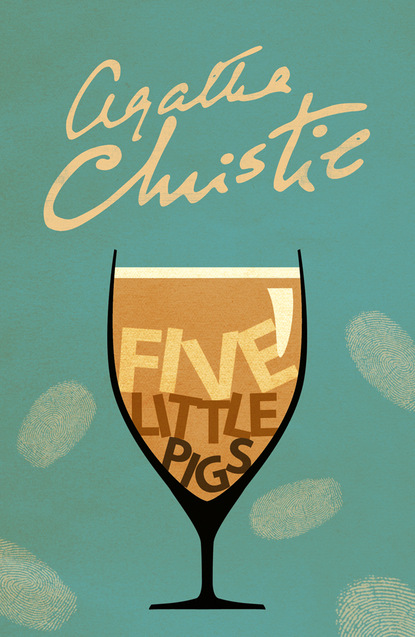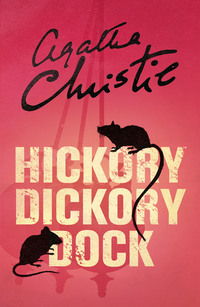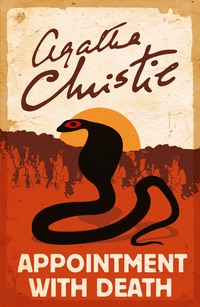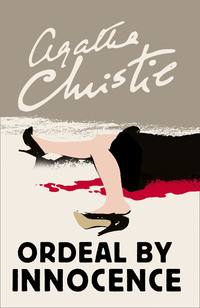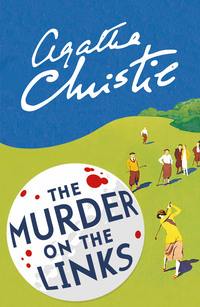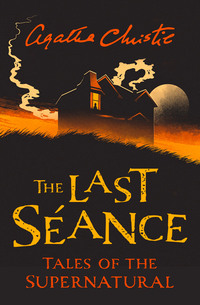
Полная версия
The Mystery of the Blue Train
But Rufus Van Aldin held up a protesting hand.
‘I am not going to look at a durned thing tonight,’ he declared. ‘They can all wait till the morning. Except this one,’ he added, looking down at the letter he held in his hand. And again that strange transforming smile stole over his face.
Richard Knighton smiled sympathetically.
‘Mrs Kettering?’ he murmured. ‘She rang up yesterday and today. She seems very anxious to see you at once, sir.’
‘Does she, now!’
The smile faded from the millionaire’s face. He ripped open the envelope which he held in his hand and took out the enclosed sheet. As he read it his face darkened, his mouth set grimly in the line which Wall Street knew so well, and his brows knit themselves ominously. Knighton turned tactfully away, and went on opening letters and sorting them. A muttered oath escaped the millionaire, and his clenched fist hit the table sharply.
‘I’ll not stand for this,’ he muttered to himself. ‘Poor little girl, it’s a good thing she has her old father behind her.’
He walked up and down the room for some minutes, his brows drawn together in a scowl. Knighton still bent assiduously over the desk. Suddenly Van Aldin came to an abrupt halt. He took up his overcoat from the chair where he had thrown it.
‘Are you going out again, sir?’
‘Yes, I’m going round to see my daughter.’
‘If Colton’s people ring up—?’
‘Tell them to go to the devil,’ said Van Aldin.
‘Very well,’ said the secretary unemotionally.
Van Aldin had his overcoat on by now. Cramming his hat upon his head, he went towards the door. He paused with his hand upon the handle.
‘You are a good fellow, Knighton,’ he said. ‘You don’t worry me when I am rattled.’
Knighton smiled a little, but made no reply.
‘Ruth is my only child,’ said Van Aldin, ‘and there is no one on this earth who knows quite what she means to me.’
A faint smile irradiated his face. He slipped his hand into his pocket.
‘Care to see something, Knighton?’
He came back towards the secretary.
From his pocket he drew out a parcel carelessly wrapped in brown paper. He tossed off the wrapping and disclosed a big, shabby, red velvet case. In the centre of it were some twisted initials surmounted by a crown. He snapped the case open, and the secretary drew in his breath sharply. Against the slightly dingy white of the interior, the stones glowed like blood.
‘My God! sir,’ said Knighton. ‘Are they—are they real?’
Van Aldin laughed a quiet little cackle of amusement.
‘I don’t wonder at your asking that. Amongst these rubies are the three largest in the world. Catherine of Russia wore them, Knighton. That centre one there is known as “Heart of Fire”. It’s perfect—not a flaw in it.’
‘But,’ the secretary murmured, ‘they must be worth a fortune.’
‘Four or five hundred thousand dollars,’ said Van Aldin nonchalantly, ‘and that is apart from the historical interest.’
‘And you carry them about—like that, loose in your pocket?’
Van Aldin laughed amusedly.
‘I guess so. You see, they are my little present for Ruthie.’
The secretary smiled discreetly.
‘I can understand now Mrs Kettering’s anxiety over the telephone,’ he murmured.
But Van Aldin shook his head. The hard look returned to his face.
‘You are wrong there,’ he said. ‘She doesn’t know about these; they are my little surprise for her.’
He shut the case, and began slowly to wrap it up again.
‘It’s a hard thing, Knighton,’ he said, ‘how little one can do for those one loves. I can buy a good portion of the earth for Ruth, if it would be any use to her, but it isn’t. I can hang these things round her neck and give her a moment or two’s pleasure, maybe, but—’
He shook his head.
‘When a woman is not happy in her home—’
He left the sentence unfinished. The secretary nodded discreetly. He knew, none better, the reputation of the Hon. Derek Kettering. Van Aldin sighed. Slipping the parcel back in his coat pocket, he nodded to Knighton and left the room.
CHAPTER 4
In Curzon Street
The Hon. Mrs Derek Kettering lived in Curzon Street. The butler who opened the door recognized Rufus Van Aldin at once and permitted himself a discreet smile of greeting. He led the way upstairs to the big double drawing-room on the first floor.
A woman who was sitting by the window started up with a cry.
‘Why, Dad, if that isn’t too good for anything! I’ve been telephoning Major Knighton all day to try and get hold of you, but he couldn’t say for sure when you were expected back.’
Ruth Kettering was twenty-eight years of age. Without being beautiful, or in the real sense of the word even pretty, she was striking-looking because of her colouring. Van Aldin had been called Carrots and Ginger in his time, and Ruth’s hair was almost pure auburn. With it went dark eyes and very black lashes—the effect somewhat enhanced by art. She was tall and slender, and moved well. At a careless glance it was the face of a Raphael Madonna. Only if one looked closely did one perceive the same line of jaw and chin as in Van Aldin’s face, bespeaking the same hardness and determination. It suited the man, but suited the woman less well. From her childhood upward Ruth Van Aldin had been accustomed to having her own way, and anyone who had ever stood up against her soon realized that Rufus Van Aldin’s daughter never gave in.
‘Knighton told me you’d phoned him,’ said Van Aldin. ‘I only got back from Paris half an hour ago. What’s all this about Derek?’
Ruth Kettering flushed angrily.
‘It’s unspeakable. It’s beyond all limits,’ she cried. ‘He—he doesn’t seem to listen to anything I say.’
There was bewilderment as well as anger in her voice.
‘He’ll listen to me,’ said the millionaire grimly.
Ruth went on.
‘I’ve hardly seen him for the last month. He goes about everywhere with that woman.’
‘With what woman?’
‘Mirelle. She dances at the Parthenon, you know.’
Van Aldin nodded.
‘I was down at Leconbury last week. I—I spoke to Lord Leconbury. He was awfully sweet to me, sympathized entirely. He said he’d give Derek a good talking to.’
‘Ah!’ said Van Aldin.
‘What do you mean by “Ah!” Dad?’
‘Just what you think I mean, Ruthie. Poor old Leconbury is a washout. Of course he sympathized with you, of course he tried to soothe you down. Having got his son and heir married to the daughter of one of the richest men in the States, he naturally doesn’t want to mess the thing up. But he’s got one foot in the grave already, everyone knows that, and anything he may say will cut darned little ice with Derek.’
‘Can’t you do anything, Dad?’ urged Ruth, after a minute or two.
‘I might,’ said the millionaire. He waited a second reflectively, and then went on. ‘There are several things I might do, but there’s only one that will be any real good. How much pluck have you got, Ruthie?’
She stared at him. He nodded back at her.
‘I mean just what I say. Have you got the grit to admit to all the world that you’ve made a mistake? There’s only one way out of this mess, Ruthie. Cut your losses and start afresh.’
‘You mean—?’
‘Divorce.’
‘Divorce!’
Van Aldin smiled drily.
‘You say that word, Ruth, as though you’d never heard it before. And yet your friends are doing it all round you every day.’
‘Oh! I know that. But—’
She stopped, biting her lip. Her father nodded comprehendingly.
‘I know, Ruth. You’re like me, you can’t bear to let go. But I’ve learnt, and you’ve got to learn, that there are times when it’s the only way. I might find ways of whistling Derek back to you, but it would all come to the same in the end. He’s no good, Ruth; he’s rotten through and through. And mind you, I blame myself for ever letting you marry him. But you were kind of set on having him, and he seemed in earnest about turning over a new leaf—and well, I’d crossed you once, honey…’
He did not look at her as he said the last words. Had he done so, he might have seen the swift colour that came up in her face.
‘You did,’ she said in a hard voice.
‘I was too durned soft-hearted to do it a second time. I can’t tell you how I wish I had, though. You’ve led a poor kind of life for the last few years, Ruth.’
‘It has not been very—agreeable,’ agreed Mrs Kettering.
‘That’s why I say to you that this thing has got to stop!’ He brought his hand down with a bang on the table. ‘You may have a hankering after the fellow still. Cut it out. Face facts. Derek Kettering married you for your money. That’s all there is to it. Get rid of him, Ruth.’
Ruth Kettering looked down at the ground for some moments, then she said, without raising her head:
‘Supposing he doesn’t consent?’
Van Aldin looked at her in astonishment.
‘He won’t have a say in the matter.’
She flushed and bit her lip.
‘No—no—of course not. I only meant—’
She stopped. Her father eyed her keenly.
‘What did you mean?’
‘I meant—’ She paused, choosing her words carefully. ‘He mayn’t take it lying down.’
The millionaire’s chin shot out grimly.
‘You mean he’ll fight the case? Let him! But, as a matter of fact, you’re wrong. He won’t fight. Any solicitor he consults will tell him he hasn’t a leg to stand upon.’
‘You don’t think’—she hesitated—‘I mean—out of sheer spite against me—he might, well, try to make it awkward?’
Her father looked at her in some astonishment.
‘Fight the case, you mean?’
He shook his head.
‘Very unlikely. You see, he would have to have something to go upon.’
Mrs Kettering did not answer. Van Aldin looked at her sharply.
‘Come, Ruth, out with it. There’s something troubling you—what is it?’
‘Nothing, nothing at all.’
But her voice was unconvincing.
‘You are dreading the publicity, eh? Is that it? You leave it to me. I’ll put the whole thing through so smoothly that there will be no fuss at all.’
‘Very well, Dad, if you really think it’s the best thing to be done.’
‘Got a fancy for the fellow still, Ruth? Is that it?’
‘No.’
The word came with no uncertain emphasis. Van Aldin seemed satisfied. He patted his daughter on the shoulder.
‘It will be all right, little girl. Don’t you worry any. Now let’s forget about all this. I have brought you a present from Paris.’
‘For me? Something very nice?’
‘I hope you’ll think so,’ said Van Aldin, smiling.
He took the parcel from his coat pocket and handed it to her. She unwrapped it eagerly, and snapped open the case. A long-drawn ‘Oh!’ came from her lips. Ruth Kettering loved jewels—always had done so.
‘Dad, how—how wonderful!’
‘Rather in a class by themselves, aren’t they?’ said the millionaire with satisfaction. ‘You like them, eh.’
‘Like them? Dad, they’re unique. How did you get hold of them?’
Van Aldin smiled.
‘Ah! that’s my secret. They had to be bought privately, of course. They are rather well known. See that big stone in the middle? You have heard of it, maybe; that’s the historic “Heart of Fire”.’
‘“Heart of Fire”!’ repeated Mrs Kettering.
She had taken the stones from the case and was holding them against her breast. The millionaire watched her. He was thinking of the series of women who had worn the jewels. The heartaches, the despairs, the jealousies. ‘Heart of Fire,’ like all famous stones, had left behind it a trail of tragedy and violence. Held in Ruth Kettering’s assured hand, it seemed to lose its potency of evil. With her cool, equable poise, this woman of the western world seemed a negation to tragedy or heart-burnings. Ruth returned the stones to their case; then, jumping up, she flung her arms round her father’s neck.
‘Thank you, thank you, thank you, Dad. They are wonderful! You do give me the most marvellous presents always.’
‘That’s all right,’ said Van Aldin, patting her shoulder. ‘You are all I have, you know, Ruthie.’
‘You will stay to dinner, won’t you, Father?’
‘I don’t think so. You were going out, weren’t you?’
‘Yes, but I can easily put that off. Nothing very exciting.’
‘No,’ said Van Aldin. ‘Keep your engagement. I have got a good deal to attend to. See you tomorrow, my dear. Perhaps if I phone you, we can meet at Galbraiths’?’
Messrs. Galbraith, Galbraith, Cuthbertson & Galbraith were Van Aldin’s London solicitors.
‘Very well, Dad.’ She hesitated. ‘I suppose it—this—won’t keep me from going to the Riviera?’
‘When are you off ?’
‘On the fourteenth.’
‘Oh, that will be all right. These things take a long time to mature. By the way, Ruth, I shouldn’t take those rubies abroad if I were you. Leave them at the bank.’
Mrs Kettering nodded.
‘We don’t want to have you robbed and murdered for the sake of “Heart of Fire”,’ said the millionaire jocosely.
‘And yet you carried it about in your pocket loose,’ retorted his daughter, smiling.
‘Yes—’
Something, some hesitation, caught her attention.
‘What is it, Dad?’
‘Nothing.’ He smiled. ‘Thinking of a little adventure of mine in Paris.’
‘An adventure?’
‘Yes, the night I bought these things.’
He made a gesture towards the jewel case.
‘Oh, do tell me.’
‘Nothing to tell, Ruthie. Some apache fellows got a bit fresh and I shot at them and they got off. That’s all.’
She looked at him with some pride.
‘You’re a tough proposition, Dad.’
‘You bet I am, Ruthie.’
He kissed her affectionately and departed. On arriving back at the Savoy, he gave a curt order to Knighton.
‘Get hold of a man called Goby; you’ll find his address in my private book. He’s to be here tomorrow morning at half-past nine.’
‘Yes, sir.’
‘I also want to see Mr Kettering. Run him to earth for me if you can. Try his Club—at any rate, get hold of him somehow, and arrange for me to see him here tomorrow morning. Better make it latish, about twelve. His sort aren’t early risers.’
The secretary nodded in comprehension of these instructions. Van Aldin gave himself into the hands of his valet. His bath was prepared, and as he lay luxuriating in the hot water, his mind went back over the conversation with his daughter. On the whole he was well satisfied. His keen mind had long since accepted the fact that divorce was the only possible way out. Ruth had agreed to the proposed solution with more readiness than he had hoped for. Yet, in spite of her acquiescence, he was left with a vague sense of uneasiness. Something about her manner, he felt, had not been quite natural. He frowned to himself.
‘Maybe I’m fanciful,’ he muttered, ‘and yet—I bet there’s something she has not told me.’
CHAPTER 5
A Useful Gentleman
Rufus Van Aldin had just finished the sparse breakfast of coffee and dry toast, which was all he ever allowed himself, when Knighton entered the room.
‘Mr Goby is below, sir, waiting to see you.’
The millionaire glanced at the clock. It was just half-past nine.
‘All right,’ he said curtly. ‘He can come up.’
A minute or two later, Mr Goby entered the room. He was a small, elderly man, shabbily dressed, with eyes that looked carefully all round the room, and never at the person he was addressing.
‘Good morning, Goby,’ said the millionaire. ‘Take a chair.’
‘Thank you, Mr Van Aldin.’
Mr Goby sat down with his hands on his knees, and gazed earnestly at the radiator.
‘I have got a job for you.’
‘Yes, Mr Van Aldin?’
‘My daughter is married to the Hon. Derek Kettering, as you may perhaps know.’
Mr Goby transferred his gaze from the radiator to the left-hand drawer of the desk, and permitted a deprecating smile to pass over his face. Mr Goby knew a great many things, but he always hated to admit the fact.
‘By my advice, she is about to file a petition for divorce. That, of course, is a solicitor’s business. But, for private reasons, I want the fullest and most complete information.’
Mr Goby looked at the cornice and murmured:
‘About Mr Kettering?’
‘About Mr Kettering.’
‘Very good, sir.’
Mr Goby rose to his feet.
‘When will you have it ready for me?’
‘Are you in a hurry, sir?’
‘I’m always in a hurry,’ said the millionaire.
Mr Goby smiled understandingly at the fender.
‘Shall we say two o’clock this afternoon, sir?’ he asked.
‘Excellent,’ approved the other. ‘Good morning, Goby.’
‘Good morning, Mr Van Aldin.’
‘That’s a very useful man,’ said the millionaire as Goby went out and his secretary came in. ‘In his own line he’s a specialist.’
‘What is his line?’
‘Information. Give him twenty-four hours and he would lay the private life of the Archbishop of Canterbury bare for you.’
‘A useful sort of chap,’ said Knighton, with a smile.
‘He has been useful to me once or twice,’ said Van Aldin. ‘Now then, Knighton, I’m ready for work.’
The next few hours saw a vast quantity of business rapidly transacted. It was half-past twelve when the telephone bell rang, and Mr Van Aldin was informed that Mr Kettering had called. Knighton looked at Van Aldin, and interpreted his brief nod.
‘Ask Mr Kettering to come up, please.’
The secretary gathered up his papers and departed. He and the visitor passed each other in the doorway, and Derek Kettering stood aside to let the other go out. Then he came in, shutting the door behind him.
‘Good morning, sir. You are very anxious to see me, I hear.’
The lazy voice with its slightly ironic inflection roused memories in Van Aldin. There was charm in it—there had always been charm in it. He looked piercingly at his son-in-law. Derek Kettering was thirty-four, lean of build, with a dark, narrow face, which had even now something indescribably boyish in it.
‘Come in,’ said Van Aldin curtly. ‘Sit down.’
Kettering flung himself lightly into an arm-chair. He looked at his father-in-law with a kind of tolerant amusement.
‘Not seen you for a long time, sir,’ he remarked pleasantly. ‘About two years, I should say. Seen Ruth yet?’
‘I saw her last night,’ said Van Aldin.
‘Looking very fit, isn’t she?’ said the other lightly.
‘I didn’t know you had had much opportunity of judging,’ said Van Aldin drily.
Derek Kettering raised his eyebrows.
‘Oh, we sometimes meet at the same night club, you know,’ he said airily.
‘I am not going to beat about the bush,’ Van Aldin said curtly. ‘I have advised Ruth to file a petition for divorce.’
Derek Kettering seemed unmoved.
‘How drastic!’ he murmured. ‘Do you mind if I smoke, sir?’
He lit a cigarette, and puffed out a cloud of smoke as he added nonchalantly:
‘And what did Ruth say?’
‘Ruth proposes to take my advice,’ said her father.
‘Does she really?’
‘Is that all you have got to say?’ demanded Van Aldin sharply.
Kettering flicked his ash into the grate.
‘I think, you know,’ he said, with a detached air, ‘that she’s making a great mistake.’
‘From your point of view she doubtless is,’ said Van Aldin grimly.
‘Oh, come now,’ said the other; ‘don’t let’s be personal. I really wasn’t thinking of myself at the moment. I was thinking of Ruth. You know my poor old Governor really can’t last much longer; all the doctors say so. Ruth had better give it a couple more years, then I shall be Lord Leconbury, and she can be châtelaine of Leconbury, which is what she married me for.’
‘I won’t have any of your darned impudence,’ roared Van Aldin.
Derek Kettering smiled at him unmoved.
‘I agree with you. It’s an obsolete idea,’ he said. ‘There’s nothing in a title nowadays. Still, Leconbury is a very fine old place, and, after all, we are one of the oldest families in England. It will be very annoying for Ruth if she divorces me to find me marrying again, and some other woman queening it at Leconbury instead of her.’
‘I am serious, young man,’ said Van Aldin.
‘Oh, so am I,’ said Kettering. ‘I am in very low water financially; it will put me in a nasty hole if Ruth divorces me, and, after all, if she has stood it for ten years, why not stand it a little longer? I give you my word of honour that the old man can’t possibly last out another eighteen months, and, as I said before, it’s a pity Ruth shouldn’t get what she married me for.’
‘You suggest that my daughter married you for your title and position?’
Derek Kettering laughed a laugh that was not all amusement.
‘You don’t think it was a question of a love match?’ he asked.
‘I know,’ said Van Aldin slowly, ‘that you spoke very differently in Paris ten years ago.’
‘Did I? Perhaps I did. Ruth was very beautiful, you know—rather like an angel or a saint, or something that had stepped down from a niche in a church. I had fine ideas, I remember, of turning over a new leaf, of settling down and living up to the highest traditions of English home-life with a beautiful wife who loved me.’
He laughed again, rather more discordantly.
‘But you don’t believe that, I suppose?’ he said.
‘I have no doubt at all that you married Ruth for her money,’ said Van Aldin unemotionally.
‘And that she married me for love?’ asked the other ironically.
‘Certainly,’ said Van Aldin.
Derek Kettering stared at him for a minute or two, then he nodded reflectively.
‘I see you believe that,’ he said. ‘So did I at the time. I can assure you, my dear father-in-law, I was very soon undeceived.’
‘I don’t know what you are getting at,’ said Van Aldin, ‘and I don’t care. You have treated Ruth darned badly.’
‘Oh, I have,’ agreed Kettering lightly, ‘but she’s tough, you know. She’s your daughter. Underneath the pink-and-white softness of her she’s as hard as granite. You have always been known as a hard man, so I have been told, but Ruth is harder than you are. You, at any rate, love one person better than yourself. Ruth never has and never will.’
‘That is enough,’ said Van Aldin. ‘I asked you here so that I could tell you fair and square what I meant to do. My girl has got to have some happiness, and remember this, I am behind her.’
Derek Kettering got up and stood by the mantelpiece. He tossed away his cigarette. When he spoke, his voice was very quiet.
‘What exactly do you mean by that, I wonder?’ he said.
‘I mean,’ said Van Aldin, ‘that you had better not try to defend the case.’
‘Oh,’ said Kettering, ‘is that a threat?’
‘You can take it any way you please,’ said Van Aldin.
Kettering drew a chair up to the table. He sat down fronting the millionaire.
‘And supposing,’ he said softly, ‘that, just for argument’s sake, I did defend the case?’
Van Aldin shrugged his shoulders.
‘You have not got a leg to stand upon, you young fool. Ask your solicitors, they will soon tell you. Your conduct has been notorious, the talk of London.’
‘Ruth has been kicking up a row about Mirelle, I suppose. Very foolish of her. I don’t interfere with her friends.’
‘What do you mean?’ said Van Aldin sharply.
Derek Kettering laughed.
‘I see you don’t know everything, sir,’ he said. ‘You are, perhaps naturally, prejudiced.’
He took up his hat and stick and moved towards the door.
‘Giving advice is not much in my line.’ He delivered his final thrust. ‘But, in this case, I should advise most strongly perfect frankness between father and daughter.’




